Horse
The horse ranks the seventh among the twelve animals in Chinese zodiac. It is associated with Wu in the Twelve Earthly Branches and the hours from 11:00 am to 1:00 pm. At the noon, Yangqi (positive energy) has reached its mount, and Yinqi (negative energy) is beginning to accumulate. At this time, the alternation of Yin and Yang makes most animals lie down and nap, while only horse stands. Therefore it is also referred to as "Horse of Wu".
The horse is the earliest animal bred by human. They are considered to have the merits of diligence, bravery and loyalty. They are people’s close companions, no matter in agriculture, hunting, warfare or transportation.
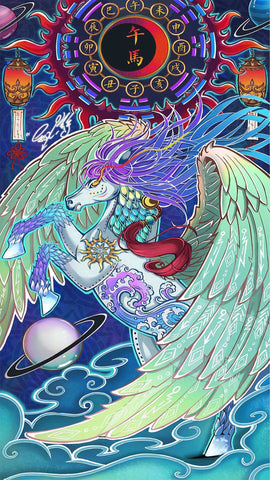
Goat
The goat ranks the eighth among the twelve animals in Chinese zodiac. It is associated with Wei in the Twelve Earthly Branches and the hours from 1:00 pm to 3:00 pm. This is the good timing for grazing, therefore it is also named the "Goat of Wei".
There is a Chinese saying, "goats know filial piety by kneeling down for nursing", which means lambs would kneel down on their front legs to suck ewe’s milk. The story tells us to pay tribute to our parents and respect the elderly. The goat is considered a mascot representing mercy and goodness.
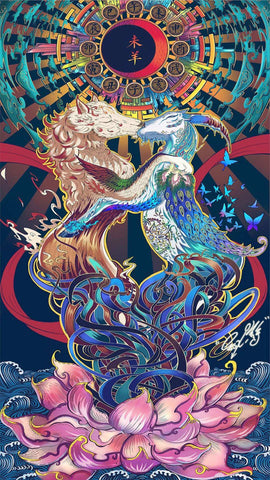
Monkey
The monkey ranks the ninth among the twelve animals in Chinese zodiac. It is associated with Shen in the Twelve Earthly Branches and the hours from 3:00 pm to 5:00 pm. This is the moment when monkeys howl the most loudly; therefore it is also named "Monkey of Shen".
In the ancient legends of China, "Yu" was a kind of monkey. They lived in trees, with white face and black cheeks, whiskers and colorful fur. Their tails were longer than their bodies, and turned forked in the end, to stuff their nostrils for watertightness when raining. They loved to go out together, the old walking in front and young behind. They shared their own food with others. They loved each other, lived together and died together. The ancients said they were "beasts with mercy".
Sodargye Khenpo’s Buddhist work A World of Misery records a story "Love Between Monther and Son" that a hunter fired at a herd of monkeys in a forest and shot a female one, the rest fleeing. When he approached it, there was a baby monkey staying with its mother and licking its wound. "Is it afraid?" thought the hunter, "Surprisingly it didn’t run away, and tried to take care of its mother." The mother tried to cover its child too. The hunter was greatly impressed by the scene.
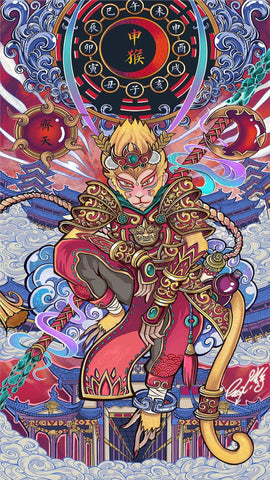
Rooster
The rooster ranks the tenth among the twelve animals in Chinese zodiac. It is associated with You in the Twelve Earthly Branches and the hours from 5:00 pm to 7:00pm. This is the sunset time, when the rooster goes back to its cage. Therefore it is also named "Rooster of You".
The rooster crows every morning on time, so it is a model of diligence and punctuality in people’s mind. Also it represents a new day and a new hope. Cockfight is one of the folk traditions, in which people watch two cocks attack each other and bet on which one will win. Rooster were regarded as role-models of bravery and boldness in the fight, despite their bloodshed. In the early Qin Dynasty, rooster and its blood were believed to drive away the evil spirits. People who lived south of the Yangtze River put rooster pictures on the gate, and thought it would scare the ghosts away. And in some places people still kill rooster to achieve the same effect.
People of Miao Ethnic Group in mountainous area in Guizhou Province have the tradition of "drinking rooster wine" before marriage. On the wedding day, the groom’s family will bring two red-feathered roosters to the bride’s house, kill them in public, and put two drops of blood in the wine and make the new couple drink it, symbolizing their everlasting love. They do not cut the heart, liver and intestine of the roosters, instead they cook these ingredients as a whole and eat the dish, to show eternal love and non betrayal. At the time, some elderly with merits will say luck words to bless the couple. This is called "drinking rooster wine".
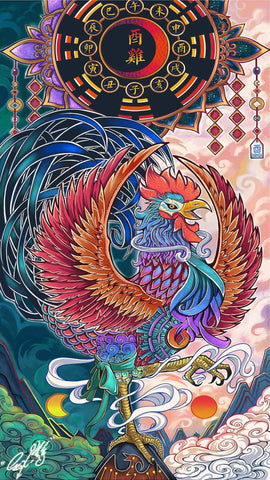
Dog
The dog ranks the eleventh among the twelve animals in Chinese zodiac. It is associated with Xu in the Twelve Earthly Branches and the hours from 7:00 pm to 9:00 pm. This is the time when people finish their daytime labor, close their doors and prepare to sleep. At this time the dog sleeps in front of the gate and guards the house. Therefore it is also named the "Dog of Xu".
Dogs were considered loyal since ancient time. Nowadays people love dogs even more, and think they come from "the plant of woof". Dog features countless folk artcrafts in the past and present, such as our beloved new-year pictures, clays and cloth crafts.
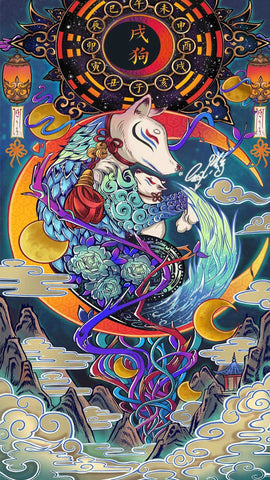
Pig
The pig ranks the twelfth among the twelve animals in Chinese zodiac. It is associated with Hai in the Twelve Earthly Branches and the hours from 9:00 pm to 11:00 pm. This is the time when the night is dark and people can hear the noise of the pig pushing the crib with its snout. Therefore it is also named the "Pig of Hai".
In folk culture, people think that that the pig is a sign of fortune. It digs the earth with the snout for food with honesty and veracity, never expecting a handout,
In the Tang Dynasty, people who took part in the imperial examinations were given braised pig hoof to eat to pray for a good grade. For the Chinese pronunciations for 猪(pig) and 朱(red) are both "zhu", 蹄(hoof) and 提(list) both "ti", eating "pig hoof" was a wish for their names written with "red" pen on the "list" of the top grades.
Zhao Kuangyi, Emperor Taizu of Song Dynasty, raised two "sacred pigs" by himself in his palace. He consecrated to them, to wish for peace and quench the evil spirits. In folk traditions, all parts of the pig are given luck names. The pig head is referred to as "godly house", the pig tongue "bringing fortune", the pig ear "smooth going". Other saying are :"profits" for the pig head, "gaining" for the pig tongue. The lucky sayings originated in the worship of the pig.
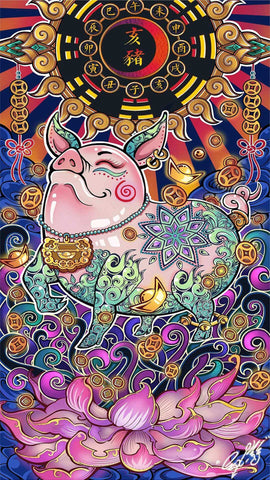
Leave a comment